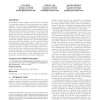Free Online Productivity Tools
i2Speak
i2Symbol
i2OCR
iTex2Img
iWeb2Print
iWeb2Shot
i2Type
iPdf2Split
iPdf2Merge
i2Bopomofo
i2Arabic
i2Style
i2Image
i2PDF
iLatex2Rtf
Sci2ools
123
Voted
SIGCOMM
2009
ACM
2009
ACM
Accountability in hosted virtual networks
Virtualization enables multiple networks, each customized for a particular purpose, to run concurrently over a shared substrate. One such model for managing these virtual networks is to create a hosting platform where companies can deploy services by leasing a portion of several physical routers. While lowering the barrier for innovation in the network, this model introduces new security concerns. In this paper we examine the issue of accountability in this setting of hosted virtual networks. That is, how a service provider can know its software is running without modification and that the infrastructure provider’s physical router is forwarding packets as instructed with the quality of service promised. Rather than presenting a single specification of what every router on the Internet must look like, in this paper we examine two possible approaches: one that detects violations by monitoring the service and one that prevents violations from occurring in the first place. For each, ...
Communications | Computer Communication Networks | Physical Router | SIGCOMM 2009 | Virtual Networks |
Related Content
| Added | 28 May 2010 |
| Updated | 28 May 2010 |
| Type | Conference |
| Year | 2009 |
| Where | SIGCOMM |
| Authors | Eric Keller, Ruby B. Lee, Jennifer Rexford |
Comments (0)

